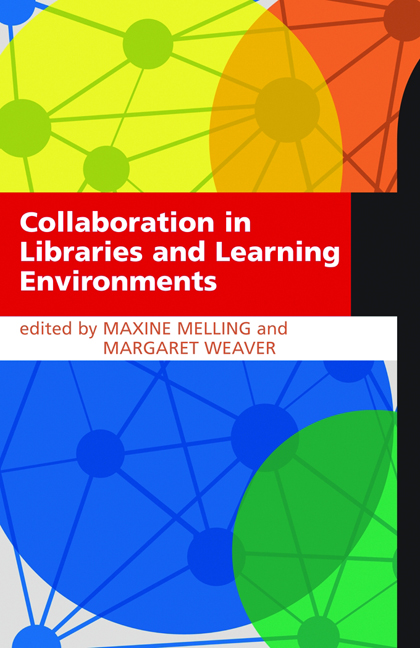Book contents
- Frontmatter
- Contents
- Contributors
- Introduction
- Abbreviations
- 1 The changing higher education context
- 2 Connecting with the student perspective
- 3 Working with professional associations
- 4 Culture, values and change: observations from three consortia in Canada
- 5 Managing complex change collaboratively
- 6 Leadership skills for collaboration: future needs and challenges
- 7 Knowing me … knowing you: the role of technology in enabling collaboration
- 8 Space: changing the boundaries
- 9 Collaborative service provision through super-convergence
- 10 Joint-use libraries and transformational change
- Index
5 - Managing complex change collaboratively
Published online by Cambridge University Press: 08 June 2018
- Frontmatter
- Contents
- Contributors
- Introduction
- Abbreviations
- 1 The changing higher education context
- 2 Connecting with the student perspective
- 3 Working with professional associations
- 4 Culture, values and change: observations from three consortia in Canada
- 5 Managing complex change collaboratively
- 6 Leadership skills for collaboration: future needs and challenges
- 7 Knowing me … knowing you: the role of technology in enabling collaboration
- 8 Space: changing the boundaries
- 9 Collaborative service provision through super-convergence
- 10 Joint-use libraries and transformational change
- Index
Summary
Acknowledgements
The author would like to thank other members of the Change Academy Team, Julie Berry, Grace Hudson, Liz Jolly, Alison Mackenzie, Maxine Melling, Jo Norry, Liz Waller and Sue White, for their creative contributions to the contents of the chapter.
Introduction
The Higher Education Academy (HEA) and the Leadership Foundation for Higher Education (LFHE) supports UK higher education institutions (HEIs) in achieving complex cultural change through their annual Change Academy (CA) programme. This chapter describes the creation of a new collaborative network of academic libraries in the north of England following an intensive cross-institutional planning initiative and presence at the HEA CA Conference and subsequent work in 2010– 11, which launched the COLLABORATE! project and the Northern Collaboration (NC). The process enabled the vision of key individuals to be converted into a tangible entity. The interplay between creative thinking, conceptual activity, teamwork and action is thought to be a constructive way to bring about complex change. I describe the thinking behind the approach, and how this was achieved at a time of volatility (and opportunity) in higher education (HE).
Context
Drivers for change in higher education
The key drivers for radical and fundamental change in the UK HE and HE library sector have been well rehearsed by many recently (Nicholas et al., 2010; Harper and Corrall, 2011; Kidd, 2010). These changes are underpinned by a raft of UK government reforms arising from a constraining financial climate and the perceived need for additional accountability in the HE system; this is coupled with the desire to give more power to the recipients of HE, most particularly students and employers.
Notable government proposals now being implemented are contained in the White Paper on HE reforms (Department for Business, Innovation and Skills, 2011), the UK Independent Review into Higher Education Funding and Student Finance, the Browne Report (Department for Business, Innovation and Skills, 2010), and the UK Government Comprehensive Spending Review 2010, which forecast a 40% reduction in core funding to the HE sector for taught provision, a sum of £2.9 billion by 2014–15 (HM Treasury, 2010). In addition a complex system of student-number controls exists aiming to increase flexibility across the HE market (for example HE delivered by commercial organizations).
- Type
- Chapter
- Information
- Collaboration in Libraries and Learning Environments , pp. 69 - 86Publisher: FacetPrint publication year: 2012



